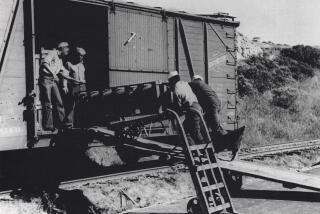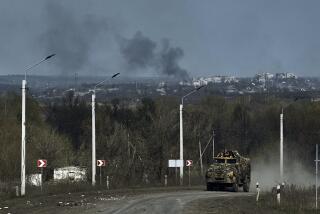‘73 Documents Dispute Nixon on POWs : Southeast Asia: Pentagon report after Nixon speech listed 67 servicemen as still captives.
- Share via
WASHINGTON — Senators investigating the fate of U.S. prisoners of war in Southeast Asia cited documents released Thursday as new evidence that the Defense Department knew that servicemen remained in captivity months after former President Richard M. Nixon declared that all prisoners had returned home.
The documents showed that 67 servicemen were listed as “current captured” by the Defense Department’s comptroller’s office for the week ending June 30, 1973, three months after Nixon made his declaration to the nation on the fate of U.S. prisoners.
Sen. John Kerry (D-Mass.), chairman of the Senate Select Committee on POW-MIA Affairs, said Thursday that the documents supported his view that the public did not get the full story when the war wound down nearly 20 years ago. “The evidence is overwhelming . . . that there is a gap in stated public policy and reality at that time,” Kerry said.
Others, however, said the lists were of questionable value in determining whether any servicemen actually remained alive at that time. Former Deputy Secretary of Defense William Clements testified Thursday that he believed in 1973, and still believes today, that those on the list were “probably dead.”
In July, 1973, Clements told Nixon in a memo that 1,278 military personnel were still unaccounted for after the war in Southeast Asia. “Of this number, 67 are officially listed as prisoner of war based on information that they reached the ground safely (from shot-down aircraft) and were captured,” Clements noted.
“In a significant number of cases, only faint hope was ever held for the individuals’ survival,” Clements said. “Although our returned prisoners could confirm the death of less than 100 men, they are of the firm opinion that none of the other missing men entered the captivity system.”
He advised Nixon that the military services would evaluate the available evidence and determine the status of each man on the missing or captured lists.
The documents listing “captured” servicemen were released by Sen. Charles E. Grassley (R-Iowa) as the select committee heard a closing round of testimony on whether any U.S. military men remained behind after the return of 591 former prisoners following the signing of the Paris Peace Accords with North Vietnam in early 1973.
The documents appear to conflict with statements by other Pentagon officials in April, 1973, that there was no reliable evidence that any Americans were alive and held against their will in Indochina.
Former Defense Secretary Elliot L. Richardson told the committee that Nixon’s statements were “misleading” in view of intelligence reports at the time on possible American captives in Laos.
Richardson sent a memo to the White House the day before Nixon’s speech saying the Defense Intelligence Agency reported that more than 350 American servicemen were either missing in action or being held prisoner in Laos.
Nixon “could have said ‘all the POWs that we know of,’ ” Richardson testified. “The President’s statement tilted in a direction so as not to raise false hopes.”
Adm. Thomas Moorer, former chairman of the Joint Chiefs of Staff, testified Thursday that two months earlier, during a meeting of key national security officials, he had hoped to see 40 or 41 names on a list of Americans held in Laos, rather than the 10 names later furnished by North Vietnam’s peace negotiators.
Just before Nixon’s speech in March, 1973, then-Secretary of State Henry A. Kissinger, the chief U.S. negotiator in the peace talks, sent an urgent message to his counterpart from Hanoi complaining that the list of U.S. prisoners in Laos was “clearly incomplete” and warned of “serious consequences” if more names were not divulged.
Less than 10 days later, however, Nixon said all American POWs were on their way home, although no additional names were added to the list of those captured in Laos.
Kerry and the panel’s ranking Republican, Sen. Robert C. Smith of New Hampshire, said they plan to travel again to Southeast Asia in November.
More to Read
Sign up for Essential California
The most important California stories and recommendations in your inbox every morning.
You may occasionally receive promotional content from the Los Angeles Times.













